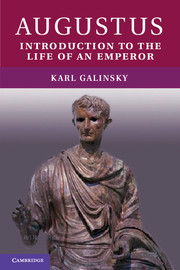Book contents
- Frontmatter
- Contents
- List of Maps, Genealogical Chart, and Illustrations
- Maps & Genealogical Chart
- Timeline
- Note on Major Ancient Sources
- Preface
- 1 From Velitrae To Caesar’s Heir
- 2 Power Struggles and Civil War
- 3 The Experiment of the Principate
- 4 The Challenge of Pax Augusta
- 5 Augustus at Home
- 6 Cultural Vitality
- 7 The Augustan Empire
- 8 The Final Days and an Assessment
- Select Bibliography and References for Further Reading
- Index
- Index of Passages and Inscriptions
6 - Cultural Vitality
Published online by Cambridge University Press: 05 February 2013
- Frontmatter
- Contents
- List of Maps, Genealogical Chart, and Illustrations
- Maps & Genealogical Chart
- Timeline
- Note on Major Ancient Sources
- Preface
- 1 From Velitrae To Caesar’s Heir
- 2 Power Struggles and Civil War
- 3 The Experiment of the Principate
- 4 The Challenge of Pax Augusta
- 5 Augustus at Home
- 6 Cultural Vitality
- 7 The Augustan Empire
- 8 The Final Days and an Assessment
- Select Bibliography and References for Further Reading
- Index
- Index of Passages and Inscriptions
Summary
The Augustan period was a time of outstanding creativity. The recuperation of peace and stability certainly was conducive – we may compare the creative burst of fifth-century Athens after the trauma of defeat and destruction had been banished; for good reasons, Augustan Rome looked back to the Athens of Pericles, its architecture and art in particular. But there was more. A major element in the dynamic of Augustan culture – besides, of course, the ideas, ideals, and values Augustan projected – was the characteristics of Augustus’ style of governing. They were not simply transferred to the arts, let alone mandated by him from the top down. Instead, and as can be readily imagined, what he did and the way he reshaped things engaged the imagination of his contemporaries and stimulated many responses. Parallels, then, are evident. They do not comprise the entire, rich spectrum of the arts under Augustus, but I will foreground them in this book, which centers on Augustus and his impact.
“Augustan” Characteristics: Overview and Some Examples
Augustus’ evolutionary principate, as we have seen, was marked by experimentation and innovation. There was a framework of guiding principles, but their execution was undoctrinaire: if one road did not work, there would be another (and in the end they all would lead to Rome and Augustus). The past was invoked but at the same time recast; diverse traditions were melded. One result was that most Augustan phenomena are, by design, many-sided; a representative sample is the varied meanings of libertas and para-constitutional terms such as auctoritas, the range of associations evoked in the first sentence of the Res Gestae, the purposes of the “moral” legislation, and the very name “Augustus.” They all have multiple dimensions, are rich in associations, and therefore elicited involvement and response.
- Type
- Chapter
- Information
- AugustusIntroduction to the Life of an Emperor, pp. 144 - 158Publisher: Cambridge University PressPrint publication year: 2012



